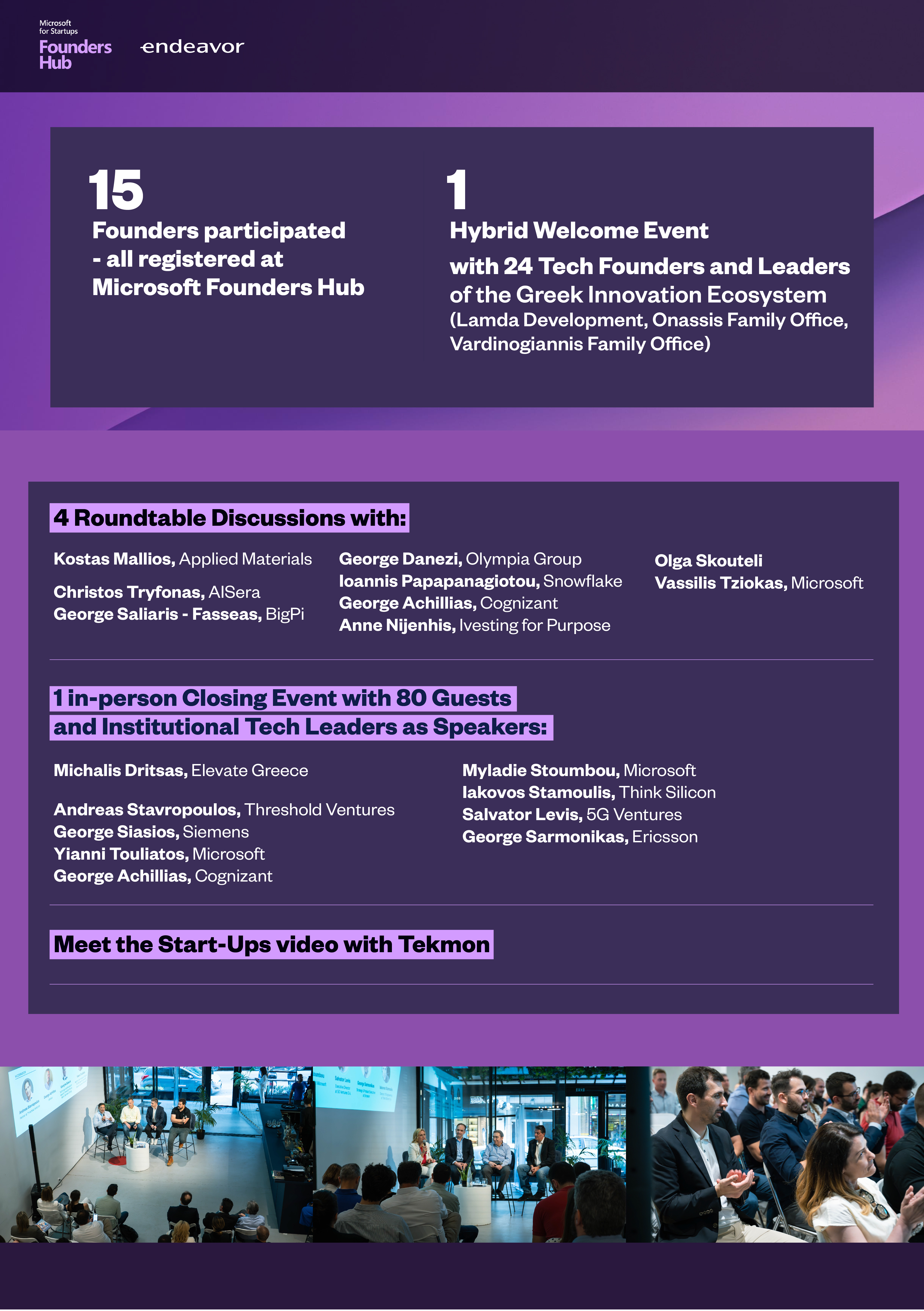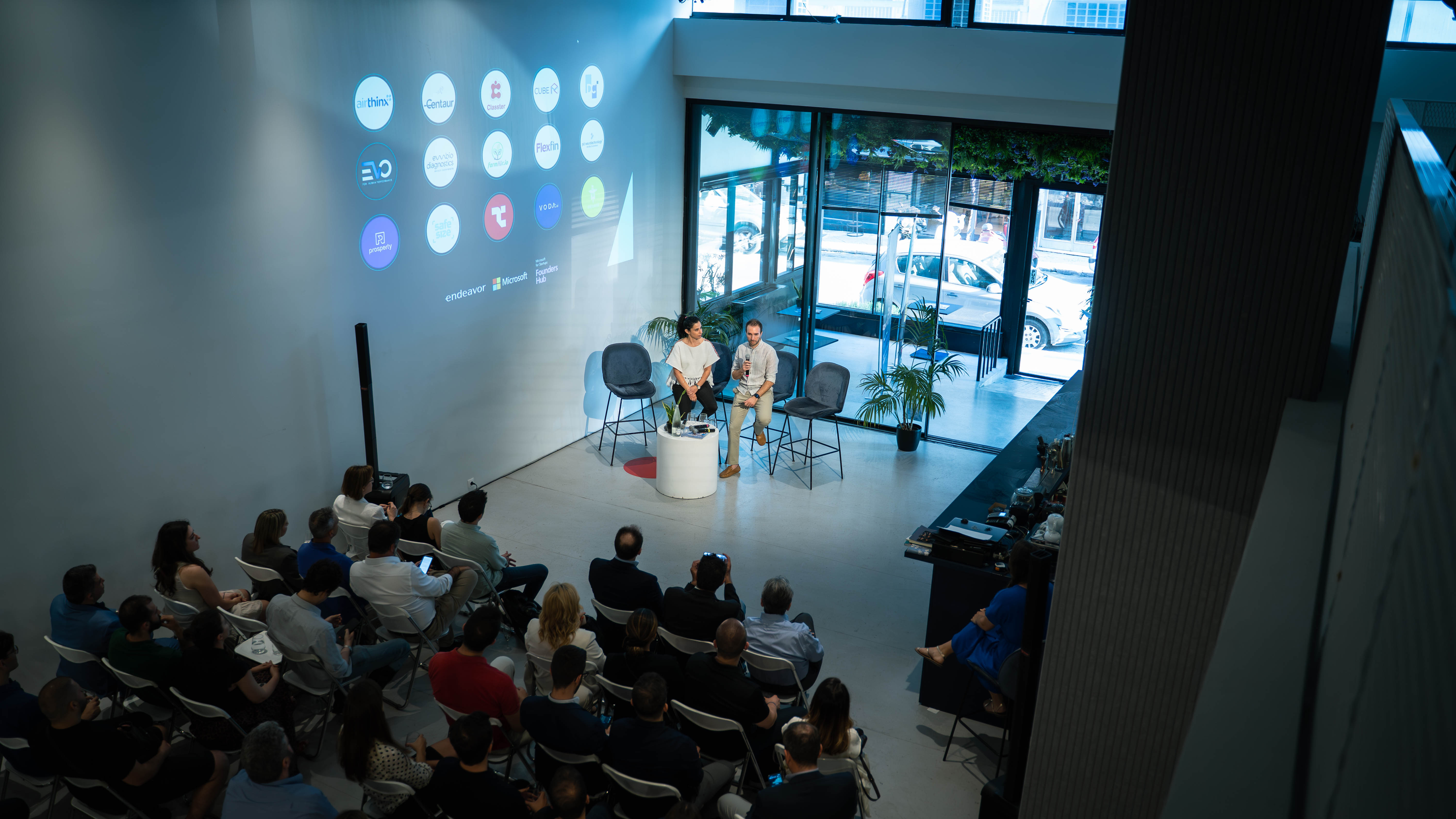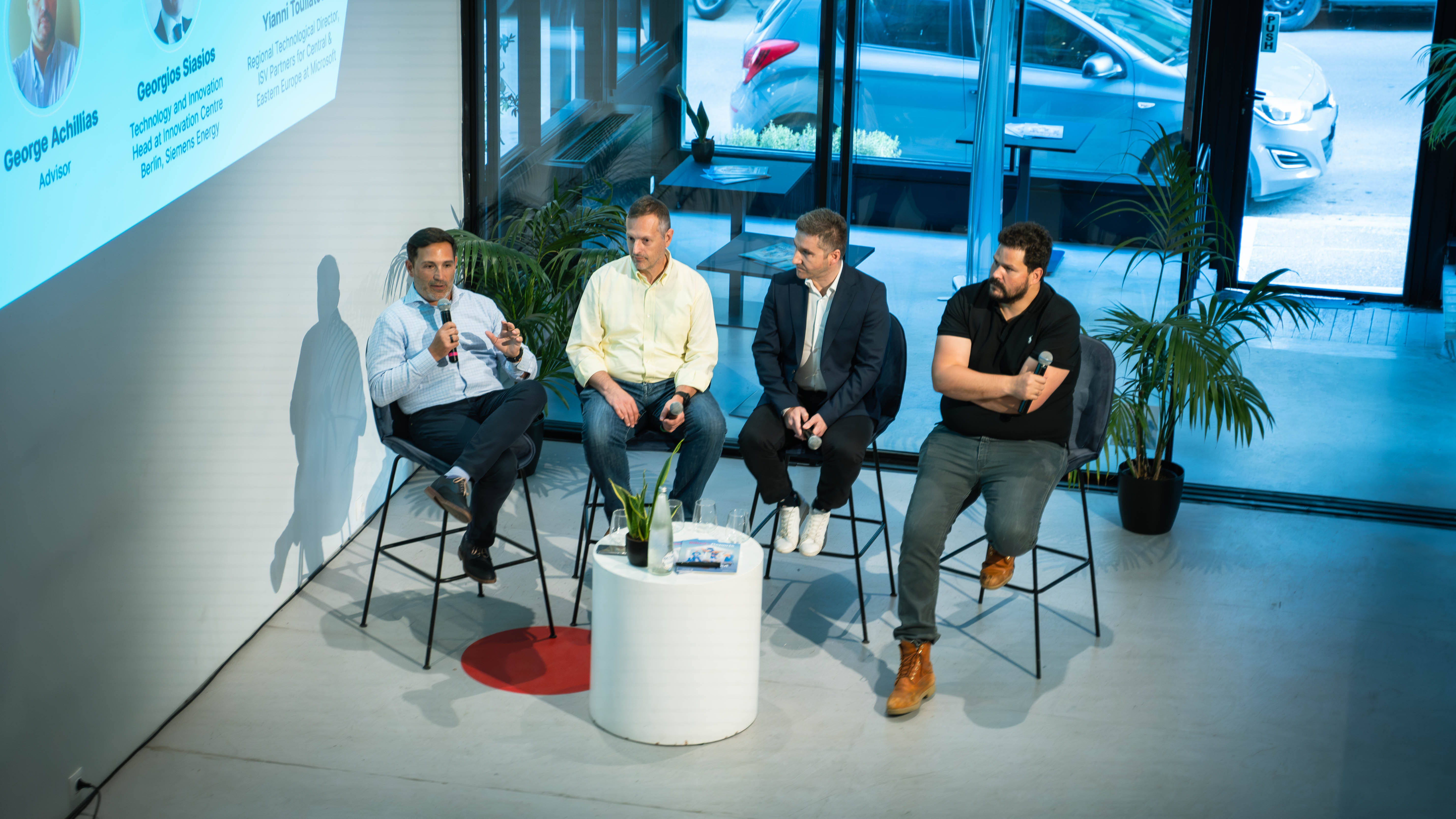Microsoft and Endeavor Greece successfully completed ScaleUp for Positive Impact, a six-month program for startups creating a positive societal impact. It emphasized speed, sustainability, and the use of artificial intelligence.
15 startups from Greece and abroad participated in the program where they gained exposure to innovative tools and best practices which include Airthinx, Centaur Technologies, Classter, CubeRM, DCI, EVO Human Performance, EMBIO Diagnostics, Farmair, Flexfin, PD Neurotechnology, Prosperty, SafeSize, Tekmon, Voda.ai & Wikifarmer.
They engaged with tech leaders to explore opportunities, challenges, and strategies at various stages of business maturity. This initiative is part of Microsoft's global Entrepreneurship for Positive Impact program, offered through the Microsoft For StartUps Founders Hub. The program's four sessions focused on the potential of AI in environmental and social governance practices, ESG, and creating a sustainability narrative that reinforces the brand.
Let's see what we've achieved thus far!

The program concluded with an exclusive event, where guests gathered to delve into the profound impact of AI on entrepreneurship and our lives as a whole.

The stage was set for a discussion led by Mylaidis Stoumbou, Regional Director of Microsoft, Salvator Levis, Executive Director at 5G Ventures S.A., Giorgos Sarmonikas, Strategy & Product Executive at Ericsson, and Iakovos Stamoulis, Director Of Engineering at Think Silicon. The panelists dived into the transformative power of generative artificial intelligence in the realm of entrepreneurship, exploring both present-day implications and future possibilities.
How does Generative AI affect Entrepreneurship?

Generative AI has the potential to revolutionize entrepreneurship by enhancing productivity through automation and optimization. Entrepreneurs can leverage AI to streamline processes, allocate resources effectively, and focus on high-value activities such as strategy and innovation. Despite privacy concerns, there is a strong momentum to address these issues through robust frameworks and regulations. This opens up opportunities for entrepreneurs to build privacy-conscious AI solutions.
Data Sharing in AI: Advantages and Disadvantages
While big companies may hesitate to share their data, startups can gain a competitive edge by utilizing generative AI. AI tools enable startups to access insights, make data-driven decisions, and accelerate time to market, leading to faster iterations and informed strategies. It is important for entrepreneurs to assess the viability and long-term potential of AI investments, considering the problem-solving capabilities and data quality of AI solutions.

The panel also emphasized the crucial role of data in generative AI. Entrepreneurs need diverse and representative datasets to train their AI systems effectively. Environmental considerations were highlighted, urging entrepreneurs to find a balance between productivity gains and sustainable practices. By optimizing energy consumption and minimizing waste, entrepreneurs can mitigate the environmental impact of AI implementation.
Impact on Entrepreneurship
Generative AI can significantly impact entrepreneurship by improving productivity, addressing privacy concerns, enabling faster time to market, requiring thoughtful investment analysis, emphasizing the importance of data, considering the environmental impact, and unlocking new content creation opportunities. It is essential for entrepreneurs to navigate the AI landscape responsibly, balancing the benefits of AI with ethical and sustainable business practices
The conversation then transitioned to the ethical considerations surrounding AI, moderated by Andreas Stavropoulos, Partner at Threshold Ventures & Board Member at Endeavor Greece. Joining him were panelists Yiannis Touliatos, Regional Technological Director, ISV Partners for Central & Eastern Europe at Microsoft, Giorgos Siassios, Technology & Innovation Head at the Innovation Center Berlin of Siemens Energy, and Giorgos Achilias, Consultant. Together, they explored the responsible and ethical use of AI, as well as the profound changes it is poised to bring to our lives.
Ethical AI

The Dilemma on AI’s Impact
It was emphasized that AI should be embraced responsibly, as it has proven to outperform humans in various tasks, and the argument as made that in some cases refraining from utilizing AI in areas such as driving cars, diagnosing diseases, and performing surgeries could be considered unethical, given its superior capabilities. However, it was also highlighted that AI should be seen as a tool, with humans retaining the ultimate decision-making power and setting the direction. AI should be purposefully employed to achieve specific goals, and individuals should remain in control of its application.
Job Displacement
Drawing on historical trends, it was acknowledged that technological advancements have consistently transformed the job market. Only 40% of present-day jobs resemble those from the 1920s, indicating that job transformation will continue. This necessitates individuals to adapt and acquire new skills. While certain jobs may be automated, there will be an increasing demand for soft skills like empathy, creativity, and critical thinking. Governments and institutions should recognize the importance of online platforms such as Coursera, offering accessible avenues for reskilling and upskilling. Embracing these opportunities will be vital for navigating the changing employment landscape and ensuring individuals remain equipped with valuable skills.
Environmental Considerations
The discussion also touched upon the environmental considerations associated with AI. Specifically, attention was given to electricity consumption and hardware design. Renewable energy sources were suggested as a means to power AI data centers, and there was an emphasis on prioritizing eco-friendly materials and implementing circularity and recycling practices for AI hardware components. It was stressed that addressing environmental concerns falls within the collective responsibility of society. Even founders of resource-constrained startups should take early measures to consider their environmental footprint. Furthermore, meeting the Environmental, Social, and Governance (ESG) requirements of investors has become crucial. Although regulation in this area may currently be lagging, it was noted that urgent matters can spur swift reactions from entities such as the EU.

Societal Shifts Due to the Use of AI
The panel also explored potential societal shifts resulting from AI implementation. The return of artisanal products and goods, including traditional spirits and handcrafted items, was predicted, suggesting a growing appreciation for unique and authentic craftsmanship. Additionally, the traditional 40-hour workweek was questioned as AI enables increased efficiency. With AI assisting in automating tasks, individuals may have more time for creativity and embracing their humanity.
Interesting points were discussed in both panels regarding generative AI and the ethical dilemmas following the use of AI in various aspects of our daily and professional lives. We touched on how entrepreneurs can leverage AI, environmental concerns, and societal shifts, and above all how we can recognize AI’s capabilities, use it to our advantage and maintain our decision-making authority.

